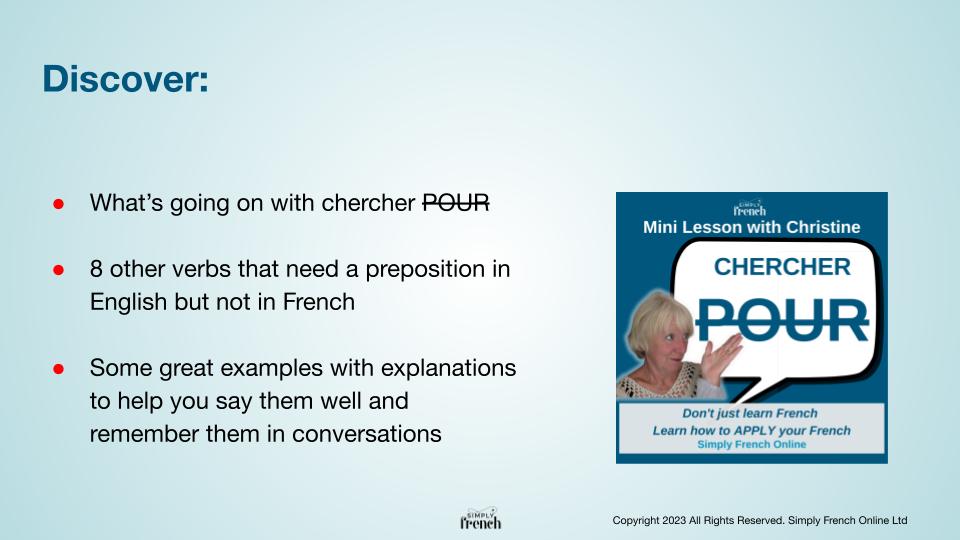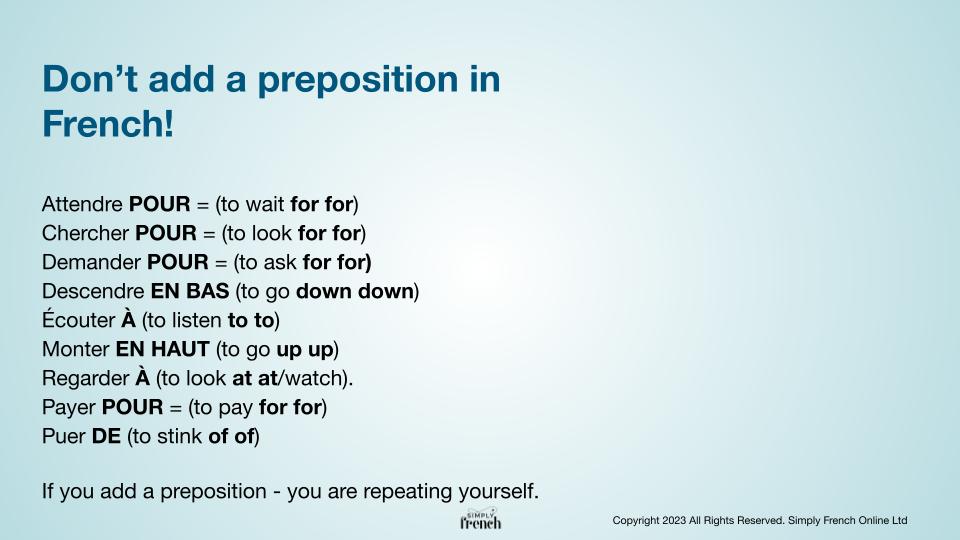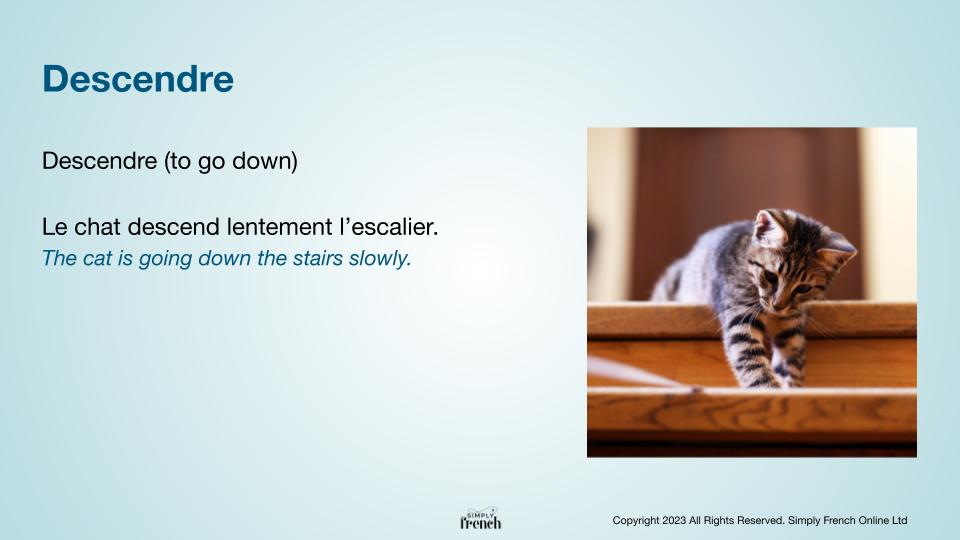Never say chercher (POUR)
Nov 06, 2023We’ve all said it: “Je cherche pour . . .” and one day someone decides to tell you that you’re repeating yourself!
We’re all on our learning journey and we always need someone to help us progress with our language learning, our pronunciation and how to use our learning in spontaneous conversations.
We could just stay as we are and be satisfied with at least managing to communicate. That’s also great . . .
Until you get hungry to be more accurate. So, as well as “Chercher pour” there are other verbs that might be tripping you up.
In this mini-lesson, you’ll discover:
- What’s going on with chercher POUR
- 8 other verbs that need a preposition in English but not in French
- Some great examples with explanations to help you say them well and remember them in conversations

What is a preposition?
A preposition is a little word that when connected to a verb, give it a special meaning. For instance, the verb to go on its own means something. Now, if you add “up”, “down”...it changes its meaning.

Verbs with prepositions in English and not in French!
Let’s have a look at some French verbs where you never ever use any preposition:
- attendre >>> to wait for
- chercher >>> to look for
- demander >>> to ask for
- descendre >>> to go down
- écouter >>> to listen to
- monter >>> to go up
- regarder >>> to look at
- payer >>> to pay for
- puer >>> to stink of

If you add a preposition in French you are repeating yourself…
Let’s have fun. Imagine that you forget and add a preposition, you would say this:
- attendre pour >>> to wait for for
- chercher pour >>> to look for for
- demander pour >>> to ask for for
- descendre en bas >>> to go down down
- écouter à >>> to listen to to
- monter en haut >>> to go up up
- regarder à >>> to look at at
- payer pour >>> to pay for for
- puer de >>> to stink of of
Although it might be funny, in one way, to repeat yourself, don’t forget that the preposition is actually “embedded” in the French verb. So, you don't need it!
So, what do you do to remember it? Let's take a look . . .

A tip when it comes to speak French.
My best advice for you is never to translate word for word but the idea. To achieve this, try this:
- visualise yourself in the context of your choosing
- say the sentence out loud
- feel what you are saying
- be it
- make it real
- create new sentences but changing the tense

How do you say to wait for in French?
Like you are going to see with all the following verbs, they are shorter in French since they do not require any additional preposition like they do in English.
The verb attendre is irregular and follows this pattern:
- j’attends >>> I am waiting for
- tu attends >>> you are waiting for
- il / elle attend >>> s/he is waiting for
- nous attendons >>> we are waiting for
- vous attendez >>> you are waiting for
- ils / elles attendent >>> they are waiting for
In a typical sentence, you would hear or see this:
- Elle attend le train à la gare >>> she is waiting for her train at the station.
So, here, you drop the preposition “for” in French.

The translation of “to look for” in French.
Are you wiling to say to look for in French? The corresponding verb is chercher which is regular.
The verb chercher goes like this:
- je cherche >>> I am looking for
- tu cherches >>> you are looking for
- il / elle cherche >>> s/he is looking for
- nous cherchons >>> we are looking for
- vous cherchez >>> you are looking for
- ils / elles cherchent >>> they are looking for
Here's an example for you:
- Elle cherche partout ses lunettes >>> she is looking for her glasses everywhere.
Once more, you drop the preposition “for” in French and you’ll be good.

Do you know how to say to ask for in French?
You will need this French verb a lot. What is it? It’s demander and it means to ask for.
This is the conjugation:
- je demande >>> I am asking for
- tu demandes >>> you are asking for
- il / elle demande >>> s/he is asking for
- nous demandons >>> we are asking for
- vous demandez >>> you are asking for
- ils / elles demandent >>> they are asking for
An illustration of the verb:
- Elle demande de l’aide >>> she is asking for help.
As usual, you drop the preposition “for” in French.

The French verb descendre meaning to go down.
Time to switch of preposition. In English when you want the verb to go down, in French, there’s a verb on its own: descendre.
You would conjugate the irregular verb like this:
- je descends >>> I am going down
- tu descends >>> you are going down
- il / elle descend >>> s/he is going down
- nous descendons >>> we are going down
- vous descendez >>> you are going down
- ils / elles descendent >>> they are going down
In real conversations, you have this:
- La chat descend lentement de l’escalier. >>> the cat is going down the stairs slowly.
This time, you drop the preposition “down” in French.

How to say listen to in French.
I have another verb with a new preposition: listen to. Guess what? In French, it’s just one regular verb: écouter.
Not sure how to conjugate it? Here’s how:
- j' écoute >>> I am listening to
- tu écoutes >>> you are listening to
- il / elle écoute >>> s/he is listening to
- nous écoutons >>> we are listening to
- vous écoutez >>> you are listening to
- ils / elles écoutent >>> they are listening to
In practice, you obtain this:
- Le chien écoute de la musique classique. >>> the dog’s listening to classical music.
Never use the preposition “at” with this French verb.

Monter, the opposite of the French verb descendre.
Earlier we have seen descendre.The opposite works the same way with no preposition at all: monter.
This regular verbs has its present tense like this
- je monte >>> I am going up
- tu montes >>> you are going up
- il / elle monte >>> s/he is going up
- nous montons >>> we are going up
- vous montez >>> you are going up
- ils / elles montent >>> they are going up
A sentence with the verb:
- On monte au sommet de la montagne. >>> we’re going up to the top of the mountain.
Whenever you play with this verb, ditch the preposition “up” in French.

Never translate this verb literally in French!
Another preposition that you won’t need in French. Indeed, whenever you wish to say to look at, simply say: regarder.
This regular verb works like this:
- je regarde >>> I am looking at
- tu regardes >>> you are looking at
- il / elle regarde >>> |'m looking at
- nous regardons >>> we are looking at
- vous regardez >>> you are looking at
- ils / elles regardent >>> they are looking at
Let’s see an example:
- Je regarde souvent ma montre. >>> I often look at my watch.
In this context, you drop the preposition “at” in French.

The French verb payer does not need any preposition.
The English verb to pay for is simply translated by the French verb: payer.
It’s easy since it’s regular:
- je paye >>> I am paying for
- tu payes >>> you are paying for
- il / elle paye >>> s/he is paying for
- nous payons >>> we are paying for
- vous payez >>> you are paying for
- ils / elles payent >>> they are paying for
Note that this verb has the particularity to have 2 different spellings. Indeed, you could write it like the following:
- je paie >>> I am paying for
- tu paies >>> you are paying for
- il / elle paie >>> s/he is paying for
- nous payons >>> we are paying for
- vous payez >>> you are paying for
- ils / elles paient >>> they are paying for
One example for you:
- Je paye le repas au restaurant. >>> I’ll pay for the meal at the restaurant.
Here, no need of the preposition “for” in French.

This verb is shorter in French.
One last verb for you where no preposition is required in French: puer.
This verb meaning to stink in English, is regular:
- je pue >>> I stink of
- tu pues >>> you stink of
- il / elle pue >>> s/he stinks of
- nous puons >>> we stink of
- vous puez >>> you stink of
- ils / elles puent >>> they stink of
In context, it would be like this:
- La poubelle pue vraiment. >>> the rubbish bin stinks really bad.
When the verb stink usually goes with the preposition "of", it’s not the case in French.
Have a look at this article where the preposition changes the meaning:
Tired and tired of something in French

In conclusion, there are many verbs in English that work with prepositions (phrasal verbs). Instead, in French, we prefer specific verbs where no preposition is required. Actually, the 2 main prepositions you could see are de and à.
Read this article to find out more:
Start making your list of your French verbs where there’s no preposition after. Or write the preposition and cross it over.
Share your examples with me. I love to see your creations - all practice helps you - and feedback is even better for you!
Free Masterclass
Learn my 4 step method of how to hold meaningful french conversations the R.E.A.L. way in just 30 minutes a day.
When you signup, we'll be sending you weekly emails with additional free content

